|
|
|
Sort Order |
|
|
|
Items / Page
|
|
|
|
|
|
|
| Srl | Item |
| 1 |
ID:
103299
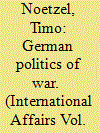

|
|
|
|
|
| Publication |
2011.
|
| Summary/Abstract |
This article analyses the way in which Germany's participation in the international intervention in Afghanistan has shaped and transformed the country's politics of defence and deriving policies. It argues that in the wake of operational challenges posed by the insurgency in northern Afghanistan since 2007, and in particular the increasing rate of German combat fatalities, established post-Cold War dogmas of German politics are becoming subject to erosion. Developments in the Kunduz region of northern Afghanistan, with the tanker bombing of 4 September 2009 as its apex, have had a catalyst function in this process. In particular, strategic, operational and tactical requirements for counterinsurgency operations have had significant politico-strategic repercussions for the country's defence and security policy more generally. As a result, in recent years the Bundeswehr has begun to undergo a far-reaching structural process of military adaptation and innovation. The article explains and analyses this phenomenon of political change and military learning in the context of political paralysis.
|
|
|
|
|
|
|
|
|
|
|
|
|
|
|
|
| 2 |
ID:
100940
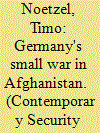

|
|
|
|
|
| Publication |
2010.
|
| Summary/Abstract |
The article analyzes the operational conduct of German forces in northern Afghanistan and the making of German strategy in the context of the International Security Assistance Force (ISAF) since the expansion of the Afghan insurgency to northern Afghanistan in 2007. It is argued that the German contribution to ISAF is characterized by a severe mismatch between politico-strategic planning and decision-making in Berlin on the one hand and operational conduct and requirements on the ground on the other. Since 2007, however, politico-strategic insistence that the German engagement in Afghanistan constitutes a contribution to a post-conflict stabilization and reconstruction effort is steadily eroding. Analysis of German operational conduct in northern Afghanistan makes evident the existing mismatch between strategy and operations, but also reveals that the deterioration of the security situation on the ground has lead to a bottom-up-development of counterinsurgency doctrine, capabilities, institutions, and modus of operandi. Operations have been driving the making of German strategy, not vice-versa, which has severely hampered German efforts to counter insurgents' progress in the north of Afghanistan.
|
|
|
|
|
|
|
|
|
|
|
|
|
|
|
|
| 3 |
ID:
133587
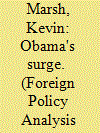

|
|
|
|
|
| Publication |
2014.
|
| Summary/Abstract |
This study examines the decision-making process leading to President Barack Obama's decision to order a troop surge in Afghanistan in December 2009. I analyze the decision-making process according to the precepts of the bureaucratic politics model and conclude that the bureaucratic politics model provides a compelling and descriptively accurate account of the Afghanistan surge decision-making process. Actors' policy preferences were influenced by consideration of bureaucratic role and position within government, significant examples of political activity occurred throughout the strategy review, and the ultimate decision was a political compromise.
|
|
|
|
|
|
|
|
|
|
|
|
|
|
|
|
| 4 |
ID:
133415
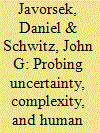

|
|
|
|
|
| Publication |
2014.
|
| Summary/Abstract |
Geopolitical dynamics associated with nuclear proliferation, the Arab Spring, the rapid rise of Chinese power, an oil-fueled Russian resurgence, and the post-Afghan and Iraq eras will demand significant changes in intelligence focus, processes, and resources. Nearly a decade after intelligence failures required a restructuring of the Intelligence Community with mandates for a scientific approach to intelligence analysis, current efforts continue to focus on overly deterministic individual analyst methods. We argue for a process-oriented approach to analysis resembling the collaborative scientific process successful in other professions that is built on shared theory and models. After demonstrating that events in the real world are path dependent and contingent on deterministic and random elements, we highlight the role of uncertainty in intelligence analysis with specific emphasis on intelligence failures. We then describe how human agency in an interconnected and interdependent system leads to a landscape of dancing strategies as agents dynamically modify their responses to events. Unfortunately, the consequences of the present deterministic intelligence mindset are significant time delays in adjusting to emerging adversaries leading to an increased susceptibility to intelligence failures. In contrast with the existing analyst-centric methods, we propose a risk management approach enhanced by outside collaboration on theory and models that embrace lessons from the twentieth-century science of uncertainty, human agency, and complexity.
|
|
|
|
|
|
|
|
|
|
|
|
|
|
|
|
| 5 |
ID:
100642


|
|
|
|
|
| Publication |
2010.
|
| Summary/Abstract |
The Afghan insurgency is pervasive, persistent and gaining in strength. There are enormous obstacles to counter-insurgency and transition in Afghanistan, and efforts to defeat the insurgents are unlikely to succeed. There is an urgent need for an inclusive peace process, involving steps towards negotiations with the Taliban.
|
|
|
|
|
|
|
|
|
|
|
|
|
|
|
|
| 6 |
ID:
133561


|
|
|
|
|
| Publication |
2014.
|
| Summary/Abstract |
Robert Johnson's The Afghan Way of War: How and Why They Fight is a book that should be particularly read by military and civilian personnel deploying to Afghanistan, even though it is not designed to be a policy guide (p. 4). Although Johnson's analysis of the Taliban period and the post-2001 US-led invasion is weak, overall the book delivers a thoughtful analysis of how and why Afghans fight, making it clear that conceptions of 'friends and enemies' carry different implications for Afghans than for westerners, as Afghans are highly conscious of prevailing circumstances. The appeal of the book is that it examines whether an Afghan 'way of war' exists and if so what motivates and drives it. To Johnson, the 'Afghan way of war' is based on topography, culture, opponents' strengths and weaknesses, financial inducement and religion. Although taking an historical approach, Johnson is careful about drawing lessons from history, arguing that historical assessments '…convey values that have been discredited in the West,' (p. 301). An added benefit of the book is Johnson's willingness to investigate Afghan domestic wars and not restrict the study to how the Afghans engaged foreigners, allowing him to declare '…there was no single Afghan way of war in the country's history. Every response has been dependent on the situation that confronted the Afghans,' (p. 36). This may explain why Johnson seems to reject the perception that when it comes to Afghanistan guerrillas do not have an added advantage on conventional forces as these forces, whether Taliban or Mujahedeen, have to contend with a chaotic command and control system, disloyalty, rivalry, poor discipline, assassination threats and weak logistics (p. 303). Johnson's meticulous research allows him to highlight that whether during the First Anglo-Afghan War or the Afghan wars of the mid-nineteenth century, which occurred mainly between the Durrani tribes, Afghans have had to deal with extreme internal divisions that led some Afghans to work with external forces. In other words, political expediency and survivability is what governs the Afghan way of war.
|
|
|
|
|
|
|
|
|
|
|
|
|
|
|
|
| 7 |
ID:
133553
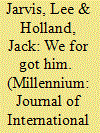

|
|
|
|
|
| Publication |
2014.
|
| Summary/Abstract |
This article explores how the death of Osama bin Laden was narrated by the Obama administration between the night of his killing and the 2012 State of the Union address. Three aspects of this unfolding story, in particular, are explored: i) descriptions of the operation itself; ii) constructions of bin Laden's life and character; iii) accounts of the significance and likely consequences of his killing. The article argues that the narration of these events was characterised, first, by considerable discursive continuity with the war on terrorism discourse of George W. Bush, and, second, by a gradual removal or 'forgetting' of bin Laden and the circumstances of his death. Each of these dynamics, we argue, contributed to the legitimisation of his killing, demonstrating the importance of narrative remembrance and forgetting alike for the conduct and justification of liberal violence.
|
|
|
|
|
|
|
|
|
|
|
|
|
|
|
|
|
|
|
|
|